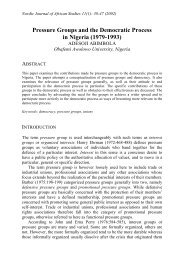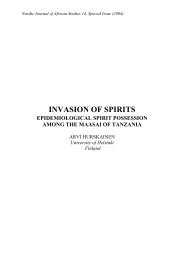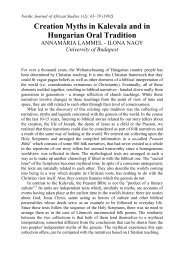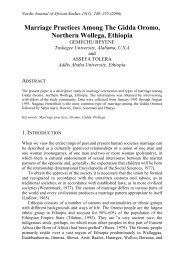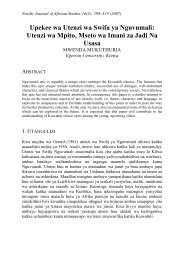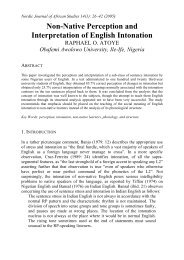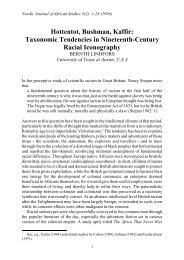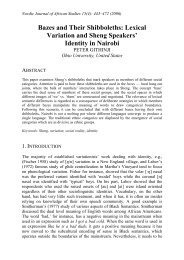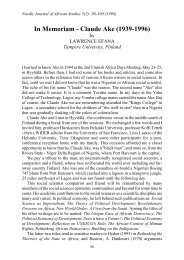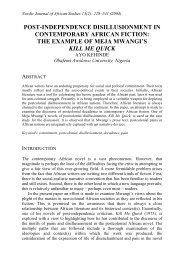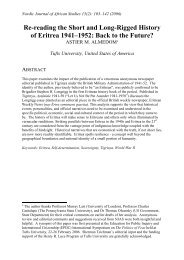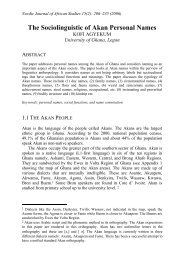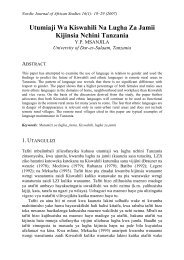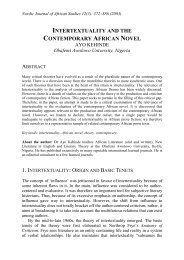Violence in the Citadel: The Menace of Secret Cults in the Nigerian ...
Violence in the Citadel: The Menace of Secret Cults in the Nigerian ...
Violence in the Citadel: The Menace of Secret Cults in the Nigerian ...
Create successful ePaper yourself
Turn your PDF publications into a flip-book with our unique Google optimized e-Paper software.
Nordic Journal <strong>of</strong> African Studies 14(1): 79–98 (2005)<br />
<strong>Violence</strong> <strong>in</strong> <strong>the</strong> <strong>Citadel</strong>: <strong>The</strong> <strong>Menace</strong> <strong>of</strong><br />
<strong>Secret</strong> <strong>Cults</strong> <strong>in</strong> <strong>the</strong> <strong>Nigerian</strong> Universities<br />
ADEWALE ROTIMI<br />
Obafemi Awolowo University, Ile-Ife, Nigeria<br />
ABSTRACT<br />
Cultism has become a major social problem both with<strong>in</strong> and outside <strong>the</strong> <strong>Nigerian</strong> universities. <strong>The</strong><br />
orig<strong>in</strong> <strong>of</strong> cultism <strong>in</strong> <strong>the</strong> <strong>Nigerian</strong> universities can be traced to <strong>the</strong> Pyrates Confraternity that was<br />
founded by <strong>the</strong> Nobel Laurete, Wole Soy<strong>in</strong>ka and o<strong>the</strong>rs at <strong>the</strong> University College, Ibadan (now<br />
called <strong>the</strong> University <strong>of</strong> Ibadan), <strong>in</strong> 1953. <strong>The</strong> confraternity which was non-violent and whose<br />
activities were never shrouded <strong>in</strong> secrecy resembled <strong>the</strong> sororities and fraternities found <strong>in</strong> many<br />
American university campuses. <strong>The</strong> aims <strong>of</strong> <strong>the</strong> Pyrates confraternity were l<strong>of</strong>ty and noble. <strong>The</strong>y<br />
wanted an end to tribalism; colonial mentality and <strong>the</strong>y wanted to revive <strong>the</strong> age <strong>of</strong> chivalry.<br />
Unfortunately towards <strong>the</strong> end <strong>of</strong> 1960’s, <strong>the</strong> orig<strong>in</strong>al aims <strong>of</strong> <strong>the</strong> Pyrates Confraternity were<br />
abandoned. <strong>The</strong> confraternity gradually metamorphosed <strong>in</strong>to a secret cult that was later to<br />
proliferate <strong>in</strong>to many spl<strong>in</strong>ter groups. This change was accelerated by yet o<strong>the</strong>r changes tak<strong>in</strong>g<br />
place both at <strong>the</strong> universities and <strong>the</strong> entire <strong>Nigerian</strong> society. <strong>The</strong> changes observable <strong>in</strong> <strong>the</strong><br />
<strong>Nigerian</strong> society <strong>in</strong>cluded violent military coups, state, sponsored political assass<strong>in</strong>ations<br />
proliferation <strong>of</strong> ethnic militia, communal clashes and total erosion <strong>of</strong> <strong>the</strong> traditional family values.<br />
Changes occurr<strong>in</strong>g with<strong>in</strong> <strong>the</strong> universities <strong>in</strong>cluded overcrowdness, under fund<strong>in</strong>g, deteriorated<br />
<strong>in</strong>frastructure and lack <strong>of</strong> virile students union activities.<br />
<strong>The</strong> emergency <strong>of</strong> secret cultism has been characterized by some bizarre and violent activities<br />
which <strong>in</strong>clude, physical torture as a means <strong>of</strong> <strong>in</strong>itiat<strong>in</strong>g new members, maim<strong>in</strong>g and kill<strong>in</strong>g <strong>of</strong> rival<br />
cult members and elim<strong>in</strong>ation <strong>of</strong> real and perceived enemies.<br />
To effectively combat secret cultism, <strong>the</strong> universities must enjoy improved fund<strong>in</strong>g,<br />
recreational academic facilities must be improved and virile students union activities must be<br />
encouraged. For <strong>the</strong> general <strong>Nigerian</strong> society, <strong>the</strong> present culture <strong>of</strong> violence <strong>in</strong> <strong>the</strong> society must be<br />
curtailed.<br />
INTRODUCTION<br />
All over <strong>the</strong> world, universities have <strong>of</strong>ten been regarded and referred to as<br />
“citadels <strong>of</strong> learn<strong>in</strong>g”. This also applied to <strong>the</strong> <strong>Nigerian</strong> universities until recently,<br />
when as a result <strong>of</strong> <strong>in</strong>cessant secret cult activities, <strong>the</strong> centres <strong>of</strong> learn<strong>in</strong>g have<br />
become “centres <strong>of</strong> violence”. Indeed, Gimba (2002) <strong>in</strong> referr<strong>in</strong>g to <strong>the</strong> cult<br />
activities <strong>in</strong> <strong>the</strong> universities referred to <strong>the</strong> universities as <strong>of</strong>fer<strong>in</strong>g “BSc” <strong>in</strong><br />
violence and “MA” <strong>in</strong> cultism. As has been observed by Eneji (1996) almost<br />
every pass<strong>in</strong>g day, <strong>the</strong>re are new stories <strong>of</strong> devilish acts perpetrated by secret cults<br />
on campuses.<br />
In describ<strong>in</strong>g <strong>the</strong> situation <strong>of</strong> cultism Eneji (1996) asserts,<br />
“From <strong>the</strong> universities to <strong>the</strong> polytechnics, colleges <strong>of</strong> education and o<strong>the</strong>r<br />
tertiary <strong>in</strong>stitutions and some secondary schools, come stories <strong>of</strong> violence,
Nordic Journal <strong>of</strong> African Studies<br />
torture and unwarranted <strong>in</strong>timidation executed by members <strong>of</strong> secret<br />
cults.”<br />
Common observation reveals that many <strong>Nigerian</strong> newspapers and magaz<strong>in</strong>es have<br />
become “bullet<strong>in</strong> boards” for report<strong>in</strong>g <strong>the</strong> daily exploits <strong>of</strong> members <strong>of</strong> secret<br />
cults. Unfortunately, despite all efforts to tackle <strong>the</strong> problem, secret cult activities<br />
<strong>in</strong> <strong>the</strong> <strong>Nigerian</strong> <strong>in</strong>stitutions <strong>of</strong> learn<strong>in</strong>g have defied all solutions. Those solutions<br />
pr<strong>of</strong>fered so far are like putt<strong>in</strong>g out an <strong>in</strong>ferno without any proper attempt made to<br />
identify <strong>the</strong> sources <strong>of</strong> <strong>the</strong> <strong>in</strong>ferno’s fuel. This paper attempts to identify those<br />
conditions that stimulate and promote cultism <strong>in</strong> Nigeria’s <strong>in</strong>stitutions <strong>of</strong> higher<br />
learn<strong>in</strong>g, most especially, <strong>the</strong> universities.<br />
This paper exam<strong>in</strong>es <strong>the</strong> problem <strong>of</strong> secret cults <strong>in</strong> <strong>the</strong> <strong>Nigerian</strong> universities <strong>in</strong><br />
a multi-layered manner. In order not to lose focus, we start from <strong>the</strong> kernel <strong>of</strong> <strong>the</strong><br />
problem, which is secret cults. We <strong>the</strong>n move outwards and discuss <strong>the</strong> changes,<br />
occurr<strong>in</strong>g <strong>in</strong> <strong>the</strong> educational sector, which have some bear<strong>in</strong>g on <strong>the</strong> emergence<br />
and proliferation <strong>of</strong> secret cults. This is followed by <strong>the</strong> analysis <strong>of</strong> those changes<br />
which have taken place with<strong>in</strong> <strong>the</strong> society generally and which also have some<br />
bear<strong>in</strong>g on <strong>the</strong> problem <strong>of</strong> secret cults. In o<strong>the</strong>r words, it will be a “bottom-up”<br />
analysis.<br />
This paper is divided <strong>in</strong>to several parts. It starts with <strong>the</strong> def<strong>in</strong>ition <strong>of</strong> a secret<br />
cult, followed by <strong>the</strong> history <strong>of</strong> secret cult <strong>in</strong> <strong>the</strong> higher <strong>in</strong>stitution <strong>of</strong> learn<strong>in</strong>g <strong>in</strong><br />
Nigeria. <strong>The</strong> next part addresses <strong>the</strong> reasons why students jo<strong>in</strong> secret cults as well<br />
as modes <strong>of</strong> recruitment <strong>in</strong>to secret cults. <strong>The</strong> third part attempts to exam<strong>in</strong>e <strong>the</strong><br />
emergence <strong>of</strong> secret cults from <strong>the</strong> perspectives <strong>of</strong> those changes tak<strong>in</strong>g place<br />
with<strong>in</strong> and outside <strong>the</strong> universities. <strong>The</strong> last part <strong>of</strong> <strong>the</strong> paper deals with<br />
discussion, conclusion and recommendations.<br />
WHAT IS A SECRET CULT?<br />
<strong>The</strong> Oxford Concise Dictionary <strong>of</strong> Sociology (1996) gives <strong>the</strong> anthropological<br />
def<strong>in</strong>ition <strong>of</strong> a “cult” as “a set <strong>of</strong> practices and beliefs <strong>of</strong> a group <strong>in</strong> relation to a<br />
local god”. It also gives a sociological def<strong>in</strong>ition <strong>of</strong> it as a small group or religious<br />
activists whose beliefs are typically secrete, esoteric and <strong>in</strong>dividualistic.<br />
Ogunbameru (1997) def<strong>in</strong>es a secret cult as an organization whose activities are<br />
kept away from <strong>the</strong> knowledge <strong>of</strong> o<strong>the</strong>rs. <strong>The</strong>se activities are essentially covert,<br />
disguised and are usually carried out beh<strong>in</strong>d closed doors (Aguda 1997). From <strong>the</strong><br />
forego<strong>in</strong>g def<strong>in</strong>itions it is safe to def<strong>in</strong>e a secret cult as a group <strong>of</strong> people whose<br />
activities are carried out <strong>in</strong> exclusive locations and unusual times without be<strong>in</strong>g<br />
exposed to <strong>the</strong> un<strong>in</strong>itiated.<br />
80
<strong>Violence</strong> <strong>in</strong> <strong>the</strong> <strong>Citadel</strong><br />
HISTORY OF SECRET CULTISM IN THE NIGERIAN UNIVERSITIES<br />
<strong>The</strong> secret cult phenomenon is not new <strong>in</strong> Africa. As Aguda (1997) has observed,<br />
activities <strong>of</strong> secret cults like, Human leopards and Human crocodiles, have been<br />
recorded <strong>in</strong> Central Africa. In Nigeria, secret cults have always existed <strong>in</strong> many<br />
parts <strong>of</strong> <strong>the</strong> country. Among <strong>the</strong> Yorubas <strong>of</strong> <strong>the</strong> Southwest can be found <strong>the</strong><br />
Ogboni <strong>Secret</strong> Cult. Among <strong>the</strong> Efiks <strong>of</strong> <strong>the</strong> Sou<strong>the</strong>astern part <strong>of</strong> Nigeria can be<br />
found <strong>the</strong> Ekpe <strong>Secret</strong> Cult (Adelola 1997). <strong>The</strong> Ek<strong>in</strong>e Cult is to be found <strong>in</strong> <strong>the</strong><br />
Delta region, <strong>the</strong> Edo <strong>of</strong> <strong>the</strong> Midwest have <strong>the</strong> Owegbe Cult, just to mention a<br />
few. Membership <strong>of</strong> <strong>the</strong>se secret cults provides sources <strong>of</strong> status, economic, social<br />
and political security, to <strong>the</strong>ir adherents.<br />
<strong>The</strong> orig<strong>in</strong> <strong>of</strong> <strong>the</strong> secret cults <strong>in</strong> <strong>the</strong> <strong>Nigerian</strong> universities can be traced back to<br />
<strong>the</strong> Pyrates Confraternity, also known as National Association <strong>of</strong> Sea Dogs,<br />
that was founded at <strong>the</strong> University College, Ibadan (now called <strong>the</strong> University <strong>of</strong><br />
Ibadan), <strong>in</strong> 1953 when <strong>the</strong> <strong>in</strong>stitution was still a satellite campus <strong>of</strong> <strong>the</strong> University<br />
<strong>of</strong> London. It has <strong>the</strong> skull and crossbones as its logo.<br />
<strong>The</strong> Seadog Confraternity was similar to <strong>the</strong> numerous fraternities and<br />
sororities, which are so ubiquitous <strong>in</strong> many American universities and colleges<br />
both <strong>in</strong> membership requirements and activities. In <strong>the</strong> United States, <strong>the</strong><br />
fraternities and sororities are sometimes called Greek Clubs because <strong>of</strong> <strong>the</strong>ir<br />
Greek names and symbols. <strong>The</strong>se Greek clubs promote, among o<strong>the</strong>r th<strong>in</strong>gs,<br />
moral uprightness, patriotism, community service and high academic and<br />
<strong>in</strong>tellectual standards.<br />
<strong>The</strong> Pyrates Confraternity at <strong>the</strong> University College, Ibadan, was formed by<br />
<strong>the</strong> first African Nobel Laurete, Pr<strong>of</strong>essor Wole Soy<strong>in</strong>ka and a few o<strong>the</strong>rs<br />
popularly known as G7. <strong>The</strong> orig<strong>in</strong>al aims <strong>of</strong> <strong>the</strong> association were very l<strong>of</strong>ty and<br />
noble. <strong>The</strong>y aimed at produc<strong>in</strong>g future <strong>Nigerian</strong> leaders who would be very proud<br />
<strong>of</strong> <strong>the</strong>ir African heritage. Thus, <strong>the</strong> Pyrates Confraternity aimed at abolish<strong>in</strong>g<br />
convention (Thomas 2002). It also wanted to revive <strong>the</strong> age <strong>of</strong> chivalry. As<br />
Thomas fur<strong>the</strong>r asserts, <strong>the</strong> Confraternity boasted <strong>of</strong> <strong>the</strong> cleanest, <strong>the</strong> brightest and<br />
<strong>the</strong> most politically conscious among <strong>the</strong> students.<br />
<strong>The</strong> ma<strong>in</strong> objectives <strong>of</strong> <strong>the</strong> seadogs have been summarized by Or<strong>in</strong>tus<strong>in</strong><br />
(1990). <strong>The</strong>y are as follows; (i) to fight non-violently but <strong>in</strong>tellectually and<br />
effectively, aga<strong>in</strong>st <strong>the</strong> imposition <strong>of</strong> foreign conventions, to revive <strong>the</strong> age <strong>of</strong><br />
chivalry, (ii) to f<strong>in</strong>d a last<strong>in</strong>g solution to <strong>the</strong> problems <strong>of</strong> tribalism and elitism.<br />
Pr<strong>of</strong>essor Wole Soy<strong>in</strong>ka was <strong>the</strong> first democratically elected “capta<strong>in</strong>” <strong>of</strong> <strong>the</strong><br />
society with <strong>the</strong> name, Capta<strong>in</strong> blood (Or<strong>in</strong>tus<strong>in</strong> 1990). Pr<strong>of</strong>essor Muyiwa Awe<br />
was Long John Silver. Many prom<strong>in</strong>ent <strong>Nigerian</strong>s who were found<strong>in</strong>g fa<strong>the</strong>rs <strong>of</strong><br />
<strong>the</strong> Confraternity <strong>in</strong>clude Pius Oleghe, Ralph Opara Aig I’Moukhuede and o<strong>the</strong>rs.<br />
<strong>The</strong> outfit <strong>of</strong> <strong>the</strong> seadogs resembled those <strong>of</strong> <strong>the</strong> pyrates <strong>of</strong> <strong>the</strong> old. Everyth<strong>in</strong>g<br />
done was healthy, fun and harmless (Or<strong>in</strong>tus<strong>in</strong> 1990). Pr<strong>of</strong>essor Soy<strong>in</strong>ka (2002)<br />
comments that <strong>the</strong> pyrates wanted to be different from <strong>the</strong> “stodgy establishment<br />
and its pretentious products <strong>in</strong> a new educational <strong>in</strong>stitution different from a<br />
81
Nordic Journal <strong>of</strong> African Studies<br />
culture <strong>of</strong> hypocritical and affluent middleclass, different from alienated colonial<br />
aristocrats”.<br />
Pr<strong>of</strong>essor Soy<strong>in</strong>ka also expla<strong>in</strong>ed that confraternities are not cults (Dixon<br />
1994). Accord<strong>in</strong>g to him, Confraternity was part <strong>of</strong> <strong>the</strong> social life <strong>of</strong> <strong>the</strong><br />
university, which existed <strong>the</strong>n, and as Adebayo (2001) has po<strong>in</strong>ted out some evil<br />
m<strong>in</strong>ds have twisted <strong>the</strong> orig<strong>in</strong>al aims <strong>of</strong> this noble tradition that was simply one <strong>of</strong><br />
campus life. Soy<strong>in</strong>ka fur<strong>the</strong>r po<strong>in</strong>ts out that <strong>the</strong> orig<strong>in</strong>al Confraternity did not<br />
swear any oath <strong>of</strong> secrecy, no b<strong>in</strong>d<strong>in</strong>g <strong>of</strong> blood and <strong>the</strong> identities <strong>of</strong> members were<br />
known to both students and staff (Adiamoh 2003).<br />
Long after <strong>the</strong> found<strong>in</strong>g fa<strong>the</strong>rs had left <strong>the</strong> University <strong>of</strong> Ibadan, <strong>the</strong><br />
Confraternity (seadogs) cont<strong>in</strong>ued to thrive. Unfortunately towards <strong>the</strong> end <strong>of</strong> <strong>the</strong><br />
1960’s, <strong>the</strong> social, political and educational changes which were occurr<strong>in</strong>g <strong>in</strong><br />
Nigeria began to affect <strong>the</strong> operations <strong>of</strong> <strong>the</strong> Confraternities. Accord<strong>in</strong>g to Adelola<br />
(1997), <strong>the</strong> first notable departure came <strong>in</strong> 1968 with <strong>the</strong> formation <strong>of</strong> <strong>the</strong> Eiye<br />
Confraternity at <strong>the</strong> University <strong>of</strong> Ibadan. Accord<strong>in</strong>g to Owoeye (1997) <strong>the</strong> Eiye<br />
Confraternity had sprung from <strong>the</strong> “Bucaneers” which also had sprung up from<br />
<strong>the</strong> sea dogs. <strong>The</strong> major force that led to <strong>the</strong> formation <strong>of</strong> new spl<strong>in</strong>ter groups<br />
from <strong>the</strong> sea dogs was basically doctr<strong>in</strong>al (Thomas 2002). For example, members<br />
<strong>of</strong> <strong>the</strong> new groups were not able to meet <strong>the</strong> high academic standard orig<strong>in</strong>ally set<br />
by <strong>the</strong> sea dogs Confraternity.<br />
<strong>The</strong> nascent groups which were formed from <strong>the</strong> sea dogs regarded <strong>the</strong><br />
pyrates as ra<strong>the</strong>r elitist whose campaigns had outlived <strong>the</strong>ir usefulness (Owoeye<br />
1997). <strong>The</strong> protestant groups which sprang up from <strong>the</strong> Pyrates Confraternity<br />
<strong>in</strong>cluded, Black eye, Vik<strong>in</strong>gs, Bucaneers, Mafia, dragons, Black Beret and o<strong>the</strong>rs.<br />
<strong>The</strong> female cults <strong>in</strong>clude, Temple <strong>of</strong> Eden, Frigrates, Barracudas, Daughters <strong>of</strong><br />
Jezebel and o<strong>the</strong>rs. Today <strong>in</strong> Nigeria, <strong>the</strong>re is hardly any tertiary <strong>in</strong>stitution which<br />
has not suffered <strong>the</strong> adverse effects <strong>of</strong> <strong>the</strong> activities <strong>of</strong> secret cults which have<br />
been characterized by violence.<br />
REASONS FOR JOINING CULTIST GROUPS<br />
Students are attracted to cultist groups for a variety <strong>of</strong> reasons. Generally <strong>the</strong><br />
social atmosphere prevail<strong>in</strong>g <strong>in</strong> <strong>the</strong> <strong>Nigerian</strong> universities provides an <strong>in</strong>spir<strong>in</strong>g<br />
environment for secret cults to thrive. <strong>The</strong>se may <strong>in</strong>clude, lack <strong>of</strong> virile student<br />
unionism, erosion <strong>of</strong> <strong>the</strong> traditional academic culture, absence <strong>of</strong> <strong>in</strong>tellectual<br />
debates and all o<strong>the</strong>r activities that are components <strong>of</strong> traditional campus culture.<br />
Those who eventually enlist <strong>in</strong> secret cult groups might have been compelled<br />
to do so because <strong>of</strong> “sagg<strong>in</strong>g egos” that need to be boosted. O<strong>the</strong>rs jo<strong>in</strong> <strong>in</strong> order to<br />
have a sense <strong>of</strong> belong<strong>in</strong>g and <strong>the</strong> need to be well “connected” (Eneji 1996). Still<br />
o<strong>the</strong>rs may jo<strong>in</strong> because <strong>of</strong> <strong>the</strong> need for f<strong>in</strong>ancial assistance, to secure girl friends<br />
or for self protection (Ogunbameru 1997). Some students are also attracted to<br />
cultist groups because <strong>the</strong>y are seek<strong>in</strong>g after mean<strong>in</strong>g, direction, comfort and love<br />
(Omotunde 1984). <strong>Secret</strong> cultism seems to have special attraction for youths who<br />
82
<strong>Violence</strong> <strong>in</strong> <strong>the</strong> <strong>Citadel</strong><br />
are emotionally disturbed and distressed. As Omotunde has fur<strong>the</strong>r observed,<br />
recruitment <strong>in</strong>to a secret cultist group is “dressed” up like a Japanese meal with<br />
“affection”, “understand<strong>in</strong>g” and “love” which easily attract <strong>the</strong> already<br />
vulnerable to <strong>the</strong> fold.<br />
<strong>The</strong> youths, especially those from broken homes, destitutes and youngsters<br />
who have flexible m<strong>in</strong>ds easily fall prey to <strong>the</strong> entreaties from cult members<br />
(Omotunde 1984). Youngsters who are lonely, depressed, dejected, disorientated<br />
and frightened sometimes drift <strong>in</strong>to <strong>the</strong> wait<strong>in</strong>g arms <strong>of</strong> secret cultists. Apart from<br />
<strong>the</strong> categories mentioned above <strong>the</strong>re are some youngsters who jo<strong>in</strong> secret cults<br />
out <strong>of</strong> sheer curiosity. As Eneji (1996) has observed, those who are tall, mascul<strong>in</strong>e<br />
and naturally tacit and those who consciously limit much <strong>in</strong>teraction with o<strong>the</strong>r<br />
students are easy preys for those recruitment “<strong>of</strong>ficers”.<br />
MODES OF OPERATION<br />
For <strong>the</strong> purposes <strong>of</strong> this paper, modes <strong>of</strong> operation will <strong>in</strong>clude recruitment,<br />
<strong>in</strong>itiation and some specific activities carried out by those who have been<br />
recruited and <strong>in</strong>itiated.<br />
RECRUITMENT<br />
A very important element <strong>in</strong> <strong>the</strong> mode <strong>of</strong> operation <strong>of</strong> secret cults is recruitment.<br />
Like any o<strong>the</strong>r social organization, recruitment must occur so that membership<br />
which might be lost through graduation, rustication, or even death, must be<br />
replenished. Recruitment exercise is closely tied to <strong>the</strong> will<strong>in</strong>gness <strong>of</strong> students to<br />
become members <strong>of</strong> secret cults. Apart from some physical and emotional<br />
attributes which have been referred to earlier, prospective cult members must<br />
demonstrate <strong>the</strong> ability to use weapons, while ability to consume alcohol and use<br />
drugs are added advantages. New recruits must also demonstrate some stoic<br />
abilities, especially, ability to bear pa<strong>in</strong>.<br />
For <strong>the</strong> prospective female cultists, wear<strong>in</strong>g <strong>of</strong> provocative dresses that<br />
accentuate natural curves and contours is almost a must (Brown 1999). <strong>The</strong>y must<br />
also be able to display an unusual bravado dur<strong>in</strong>g altercations with un<strong>in</strong>itiated<br />
female students. Some <strong>of</strong> <strong>the</strong> most popular female secret cults are, Black braziers,<br />
Amazons, Jezebels, White pants, just to name a few. A prospective female cultist,<br />
accord<strong>in</strong>g to Okwe (2002) must be a smoker <strong>of</strong> all brands <strong>of</strong> cigarettes, she must<br />
be able to consume all k<strong>in</strong>ds <strong>of</strong> alcohol, she must be familiar with and, if possible,<br />
possess a pistol or an axe. She must also be rich, bold and have very “big” men<br />
friends. To guarantee her acceptance, she must pass <strong>the</strong> torture test. Be<strong>in</strong>g a<br />
lesbian is an added advantage. She must also cultivate <strong>the</strong> habit <strong>of</strong> wear<strong>in</strong>g jeans<br />
83
Nordic Journal <strong>of</strong> African Studies<br />
(Okwe 2002). She must possess a wardrobe <strong>of</strong> weird attires that can make heads<br />
turn whenever she passes by.<br />
To <strong>the</strong> psychologically distressed, secret cults <strong>of</strong>fer succour (Omotunde<br />
1984). <strong>The</strong> succour is <strong>in</strong> form <strong>of</strong> love, affection and some degree <strong>of</strong> emotional<br />
security.<br />
Students who are sought after by secret cults vary <strong>in</strong> social backgrounds. <strong>The</strong>y<br />
might be children <strong>of</strong> pr<strong>of</strong>essors, judges, politicians, senior police <strong>of</strong>ficers and so<br />
on. <strong>The</strong> status <strong>of</strong> <strong>the</strong>ir parents <strong>in</strong> society guarantees <strong>the</strong>m some protection from<br />
<strong>the</strong> claws <strong>of</strong> law enforcement agents <strong>in</strong> <strong>the</strong> event that <strong>the</strong>y get <strong>in</strong>to trouble.<br />
Initiation naturally follows recruitment.<br />
INITIATION<br />
<strong>The</strong> <strong>in</strong>itiation process commences immediately after new recruits have been<br />
thoroughly screened. <strong>The</strong> first step <strong>in</strong> <strong>the</strong> <strong>in</strong>itiation process is swear<strong>in</strong>g an oath <strong>of</strong><br />
allegiance and secrecy. As Thomas (2002) has observed, dur<strong>in</strong>g an <strong>in</strong>itiation<br />
ceremony, <strong>the</strong> eyes <strong>of</strong> <strong>the</strong> <strong>in</strong>itiate are expected to be closed while some<br />
<strong>in</strong>cantations are recited. New entrants are subjected to thorough beat<strong>in</strong>g as a<br />
means <strong>of</strong> toughen<strong>in</strong>g <strong>the</strong>m and test<strong>in</strong>g <strong>the</strong>ir endurance for pa<strong>in</strong>.<br />
On <strong>the</strong> <strong>in</strong>itiation day, <strong>the</strong> new entrants are made to dr<strong>in</strong>k some concoctions<br />
mixed with blood (Thomas 2002). Sometimes <strong>the</strong>y are given some tough<br />
assignments like rap<strong>in</strong>g a very popular female student or a female member <strong>of</strong> <strong>the</strong><br />
university staff. For <strong>the</strong> female cultists, <strong>the</strong>ir <strong>in</strong>itiation may <strong>in</strong>clude be<strong>in</strong>g forced<br />
to engage <strong>in</strong> some immoral activities. Brown (1999) has observed that, among <strong>the</strong><br />
Jezebels and Amazons for example, new entrants may be made to undergo six<br />
rounds <strong>of</strong> rigorous <strong>in</strong>tercourse <strong>in</strong> quick successions. <strong>The</strong>y may also be made to<br />
fight with o<strong>the</strong>r girls or strong boys. <strong>The</strong>y may also be subjected to thorough<br />
flogg<strong>in</strong>g. New entrants are expected to move around <strong>in</strong> groups <strong>of</strong> four or five as a<br />
means <strong>of</strong> protect<strong>in</strong>g <strong>the</strong>mselves aga<strong>in</strong>st possible sexual harassment. Dur<strong>in</strong>g <strong>the</strong><br />
<strong>in</strong>itiation new members are taught to communicate with o<strong>the</strong>r members <strong>in</strong> coded<br />
language. Hav<strong>in</strong>g been recruited and <strong>in</strong>itiated, cult members are expected to<br />
engage <strong>in</strong> many activities, which form parts <strong>of</strong> <strong>the</strong> group norm.<br />
VARIOUS ACTIVITIES OF SECRET CULT MEMBERS<br />
Although <strong>the</strong> history <strong>of</strong> cultism on <strong>the</strong> university campuses <strong>in</strong> Nigeria dates back<br />
to some fifty years, its <strong>in</strong>volvement <strong>in</strong> violence became manifest only some two<br />
decades ago. Ak<strong>in</strong>bami (1991) has observed, for example, that <strong>the</strong> Confraternity<br />
from which <strong>the</strong> present secret cults developed performed some significantly useful<br />
services on <strong>the</strong> university campuses dur<strong>in</strong>g <strong>the</strong> 1960’s and 1970’s. For example,<br />
members <strong>of</strong> Confraternities formed <strong>the</strong> <strong>in</strong>ner caucus that determ<strong>in</strong>ed, who, among<br />
84
<strong>Violence</strong> <strong>in</strong> <strong>the</strong> <strong>Citadel</strong><br />
<strong>the</strong> students, occupied what positions <strong>in</strong> <strong>the</strong> student union government. It was not<br />
uncommon for Confraternity members to assiduously work for <strong>the</strong> removal <strong>of</strong><br />
student union executives who performed below expectation.<br />
On different campuses across <strong>the</strong> country, cults were <strong>in</strong> <strong>the</strong> forefront <strong>of</strong><br />
promot<strong>in</strong>g law and order. Ak<strong>in</strong>bami (1991) has <strong>in</strong>deed observed that <strong>in</strong> <strong>the</strong> 1960’s<br />
and 1970’s, <strong>the</strong> University <strong>of</strong> Lagos employed <strong>the</strong> services <strong>of</strong> <strong>the</strong> Panama<br />
Confraternity to usher <strong>in</strong> dist<strong>in</strong>guished visitors who came to <strong>the</strong> campus. For<br />
example, <strong>the</strong> Pan African Black axe confraternity normally commemorated <strong>the</strong><br />
murder <strong>of</strong> anti-apar<strong>the</strong>id students who were murdered <strong>in</strong> Sharpeville, South<br />
Africa.<br />
Unfortunately, however, from <strong>the</strong> beg<strong>in</strong>n<strong>in</strong>g <strong>of</strong> <strong>the</strong> 1980’s, <strong>the</strong> activities <strong>of</strong><br />
Confraternities became virulently violent and secrecy became <strong>the</strong>ir ways <strong>of</strong> life.<br />
<strong>The</strong>ir activities <strong>in</strong>cluded “deal<strong>in</strong>g” with any non-members who snatched a<br />
member’s girl friend or “sugar daddy” (<strong>in</strong> case <strong>of</strong> female cultists). <strong>The</strong>ir activities<br />
also <strong>in</strong>cluded “settl<strong>in</strong>g” lecturers <strong>in</strong> cash or k<strong>in</strong>d (Okwe 2002). Female cultists<br />
began to operate prostitution r<strong>in</strong>gs and hav<strong>in</strong>g <strong>the</strong>ir photographs displayed <strong>in</strong><br />
popular hotels. From this period on, secret cults sprang up <strong>in</strong> <strong>the</strong> country like<br />
mushrooms with <strong>the</strong>ir activities assum<strong>in</strong>g more devastat<strong>in</strong>g and dangerous<br />
proportions. <strong>The</strong>y became nightmares to <strong>the</strong> general student communities, parents<br />
and successive military and civilian adm<strong>in</strong>istrations.<br />
It is almost impossible to accurately and empirically document <strong>the</strong> amount <strong>of</strong><br />
crime result<strong>in</strong>g from secret cult activities. In Nigeria, <strong>the</strong> police rema<strong>in</strong>s <strong>the</strong> major<br />
source <strong>of</strong> crime data. Unfortunately, <strong>the</strong> police records do not <strong>in</strong>dicate which<br />
crimes specifically result from secret cult activities. Consequently, possible<br />
crimes result<strong>in</strong>g from secret cult activities are diffused among such crimes as<br />
rape, manslaughter, arson and o<strong>the</strong>rs.<br />
Accord<strong>in</strong>g to <strong>the</strong> crim<strong>in</strong>al code, to be successfully accused <strong>of</strong> secret cultism it<br />
is required that <strong>the</strong> <strong>of</strong>fender be caught wear<strong>in</strong>g full secret cult regalia. This is not<br />
possible because most <strong>of</strong> <strong>the</strong> secret cult activities take place at night under <strong>the</strong><br />
cover <strong>of</strong> darkness <strong>in</strong> unusual places. Also, for about two decades now, policemen<br />
have been banned from operat<strong>in</strong>g on <strong>the</strong> university campuses <strong>in</strong> Nigeria. It is to be<br />
noted that former secret cult members hardly come out to share <strong>the</strong>ir experiences<br />
as cult members with <strong>the</strong> general public for fear <strong>of</strong> reprisals from members who<br />
are still active. Consequently, data on secret cult activities <strong>in</strong> Nigeria must be<br />
teased out <strong>of</strong> newspaper reports, magaz<strong>in</strong>es and occasionally from anonymous<br />
personal anecdotes. An exam<strong>in</strong>ation <strong>of</strong> some random reports which throw some<br />
light on <strong>the</strong> extent <strong>of</strong> violent activities <strong>of</strong> secret cults <strong>in</strong> <strong>the</strong> <strong>Nigerian</strong> universities is<br />
now presented.<br />
One <strong>of</strong> <strong>the</strong> earliest reported secret cult violence occurred at <strong>the</strong> University <strong>of</strong><br />
Nigeria, Nsukka <strong>in</strong> 1985 when a non-cult student <strong>in</strong>curred <strong>the</strong> wrath <strong>of</strong> ano<strong>the</strong>r<br />
student, who was a cult leader, for “snatch<strong>in</strong>g” <strong>the</strong> latter’s girlfriend (Akor 1994).<br />
It was also reported by Eneji (1996) that sometimes <strong>in</strong> 1991 a student at <strong>the</strong><br />
University <strong>of</strong> Port Harcourt was beheaded dur<strong>in</strong>g a feud between cult members. In<br />
1993, fifteen students <strong>of</strong> <strong>the</strong> University <strong>of</strong> Port Harcourt were jailed for terms<br />
85
Nordic Journal <strong>of</strong> African Studies<br />
vary<strong>in</strong>g from five to thirty years for belong<strong>in</strong>g to secret cults. <strong>The</strong>y were jailed by<br />
<strong>the</strong> miscellaneous <strong>of</strong>fences tribunal which sat at Enugu, Anambra State <strong>in</strong> Eastern<br />
Nigeria (Daily Times, 23 rd Jan, 1993, p. 7).<br />
Ano<strong>the</strong>r report was <strong>of</strong> Ambrose Alli University. Also at Delta State<br />
University <strong>in</strong> Abraka, <strong>the</strong> activities <strong>of</strong> secret cult groups resulted <strong>in</strong> <strong>the</strong> death <strong>of</strong> a<br />
Pr<strong>in</strong>cipal Assistant Registrar and his wife. Two secret cult groups – <strong>the</strong> Black axe<br />
and <strong>the</strong> Bucaneers were engaged <strong>in</strong> what appeared like an all-out war.<br />
On 10 th July, 1999, armed cultists stormed a male hostel at Obafemi Awolowo<br />
University brutally murder<strong>in</strong>g five students. Many pages <strong>of</strong> <strong>the</strong> <strong>Nigerian</strong> Tribune<br />
<strong>of</strong> 24 th July, 1999 were devoted to <strong>the</strong> extensive report<strong>in</strong>g <strong>of</strong> <strong>the</strong> event.<br />
Aga<strong>in</strong>, Olubusuyi (2002) reported that <strong>the</strong> students <strong>of</strong> Delta State University<br />
<strong>in</strong> Abraka, carried out a massive destruction <strong>of</strong> some parts <strong>of</strong> <strong>the</strong> campus on 7 th<br />
September, 2002. <strong>The</strong> Vice Chancellor’s lodge was burnt <strong>in</strong> <strong>the</strong> process, so also<br />
was <strong>the</strong> department <strong>of</strong> l<strong>in</strong>guistic build<strong>in</strong>g. On 5 th August, 2002 a 300 level<br />
economics student was shot and slaughtered at <strong>the</strong> Dalimore area <strong>of</strong> Ado-Ekiti,<br />
<strong>the</strong> Capital City <strong>of</strong> Ekiti State. Koleoso (2002) traced <strong>the</strong> source <strong>of</strong> <strong>the</strong> crime to<br />
cultists. Incidentally <strong>the</strong> sla<strong>in</strong> student was <strong>the</strong> only child <strong>of</strong> his parents.<br />
At <strong>the</strong> University <strong>of</strong> Jos <strong>in</strong> Plateau State, Shobayo (2002) reported that two<br />
undergraduates were callously shot dead while <strong>the</strong>y were deeply asleep. This<br />
happened when some cultist groups were engaged <strong>in</strong> a battle <strong>of</strong> supremacy dur<strong>in</strong>g<br />
<strong>the</strong> miss “Unijos” competition.<br />
In Edo State, Ayodele (2003) reported that some crim<strong>in</strong>als suspected to be<br />
cultists set a house ablaze at 32 Omokaro Street, Ben<strong>in</strong> City when <strong>the</strong> cultists,<br />
after ransack<strong>in</strong>g <strong>the</strong> house could not f<strong>in</strong>d <strong>the</strong> people <strong>the</strong>y were look<strong>in</strong>g for. To put<br />
<strong>the</strong> problem <strong>of</strong> secret cultism <strong>in</strong> proper perspective, it is necessary to exam<strong>in</strong>e <strong>in</strong>to<br />
details, <strong>the</strong> general decay <strong>in</strong> <strong>the</strong> education sector and <strong>the</strong> state <strong>of</strong> anomie which<br />
has been pervasive <strong>in</strong> Nigeria <strong>in</strong> <strong>the</strong> past two decades. This will help <strong>in</strong> properly<br />
understand<strong>in</strong>g <strong>the</strong> problem <strong>of</strong> secret cultism <strong>in</strong> our universities.<br />
SOCIAL CHANGE IN THE EDUCATION SECTOR AND THE NIGERIAN<br />
SOCIETY<br />
In <strong>the</strong> past two decades, many dramatic changes have taken place <strong>in</strong> <strong>the</strong> <strong>Nigerian</strong><br />
Society generally and <strong>in</strong> <strong>the</strong> education sector <strong>in</strong> particular. <strong>The</strong> changes are so<br />
<strong>in</strong>tertw<strong>in</strong>ed and <strong>in</strong>terwoven that <strong>the</strong>y can only be separated for analytical<br />
purposes.<br />
SOCIAL CHANGES IN THE EDUCATION SECTOR AND THEIR EFFECTS ON<br />
SECRET CULTISM<br />
In <strong>the</strong> past three decades, some drastic changes have been observed <strong>in</strong> <strong>the</strong><br />
education sector. <strong>The</strong>se changes have, <strong>in</strong> turn, impacted on <strong>the</strong> growth and spread<br />
86
<strong>Violence</strong> <strong>in</strong> <strong>the</strong> <strong>Citadel</strong><br />
<strong>of</strong> secret cult activities <strong>in</strong> <strong>the</strong> universities. Among <strong>the</strong>se are, demographic<br />
changes, fall<strong>in</strong>g standard <strong>of</strong> education, reduced and <strong>in</strong>adequate fund<strong>in</strong>g,<br />
dis<strong>in</strong>tegration <strong>of</strong> <strong>in</strong>frastructure and <strong>the</strong> emergence <strong>of</strong> culture <strong>of</strong> violence <strong>in</strong> our<br />
universities.<br />
DEMOGRAPHIC CHANGES IN THE NIGERIAN UNIVERSITIES<br />
For a proper and mean<strong>in</strong>gful discussion on <strong>the</strong> demographic changes which have<br />
occurred <strong>in</strong> <strong>the</strong> <strong>Nigerian</strong> universities, it is necessary to step back a little and<br />
exam<strong>in</strong>e <strong>the</strong> situations <strong>in</strong> both primary and secondary schools which produce<br />
students who eventually become undergraduates. For example, <strong>the</strong> age at which<br />
pupils leave secondary school, <strong>the</strong> type <strong>of</strong> socialization that takes place <strong>of</strong><br />
violence has been firmly entrenched, s<strong>in</strong>ce <strong>the</strong> first military coup <strong>of</strong> 1966; cultism<br />
can be viewed as an extension <strong>of</strong> <strong>the</strong> culture <strong>of</strong> violence, which is so visible and<br />
prevalent <strong>in</strong> <strong>the</strong> <strong>Nigerian</strong> Society. Indeed, <strong>the</strong> university campuses are a<br />
microcosm <strong>of</strong> <strong>the</strong> <strong>Nigerian</strong> Society.<br />
<strong>The</strong> culture <strong>of</strong> violence, which has become entrenched <strong>in</strong> <strong>the</strong> <strong>Nigerian</strong><br />
Society, has many elements or components. <strong>The</strong>y <strong>in</strong>clude, series <strong>of</strong> military<br />
coups, state sponsored violence, political assass<strong>in</strong>ations, activities <strong>of</strong> ethnic militia<br />
and communal clashes. <strong>The</strong>se have been accelerated by <strong>the</strong> breakdown <strong>of</strong> <strong>the</strong><br />
traditional family structures.<br />
MILITARY COUPS<br />
Detailed analysis <strong>of</strong> military coups which took place <strong>in</strong> Nigeria between 1966 and<br />
1983 is beyond <strong>the</strong> scope <strong>of</strong> <strong>the</strong> work. Suffice it to say, however, that <strong>the</strong><br />
emergence <strong>of</strong> military coups <strong>in</strong> <strong>the</strong> <strong>Nigerian</strong> body politics also marked <strong>the</strong> <strong>of</strong>ficial<br />
<strong>in</strong>troduction <strong>of</strong> violence as a way <strong>of</strong> resolv<strong>in</strong>g political conflicts.<br />
<strong>The</strong> first military coup <strong>in</strong> Nigeria took place on 15 th January, 1966. In this<br />
coup many top politicians, especially those from <strong>the</strong> <strong>the</strong>n Nor<strong>the</strong>rn and Western<br />
Regions were murdered <strong>in</strong> cold blood. This first coup <strong>in</strong>troduced <strong>the</strong> first<br />
<strong>in</strong>stitutionalized violence <strong>in</strong>to <strong>the</strong> <strong>Nigerian</strong> politics. In July 1967, <strong>the</strong>re was yet,<br />
ano<strong>the</strong>r coup <strong>in</strong> which many senior military <strong>of</strong>ficers (<strong>in</strong>clud<strong>in</strong>g <strong>the</strong> <strong>the</strong>n head <strong>of</strong><br />
state) were violently elim<strong>in</strong>ated. This was to be followed by <strong>the</strong> civil <strong>of</strong> which<br />
lasted for three years (1967–1970). For <strong>the</strong> first time <strong>in</strong> <strong>the</strong> history <strong>of</strong> Nigeria,<br />
dead bodies <strong>of</strong> <strong>Nigerian</strong>s were see<strong>in</strong>g ly<strong>in</strong>g and decay<strong>in</strong>g by <strong>the</strong> roadside. By <strong>the</strong><br />
civil war, violence became permanently pressed <strong>in</strong>to <strong>the</strong> psyche <strong>of</strong> an average<br />
<strong>Nigerian</strong>. <strong>The</strong> civil war also <strong>in</strong>troduced <strong>Nigerian</strong>s to <strong>the</strong> use <strong>of</strong> deadly and<br />
sophisticated weapons like handguns, mach<strong>in</strong>e guns, assault rifles and so on. In<br />
February 1976 <strong>the</strong>re was ano<strong>the</strong>r coup <strong>in</strong> which General Murtala Mohammed, <strong>the</strong><br />
<strong>the</strong>n head <strong>of</strong> state was brutally murdered. O<strong>the</strong>r coups which took place <strong>in</strong> 1983,<br />
87
Nordic Journal <strong>of</strong> African Studies<br />
1985 and 1993 did not <strong>in</strong>volve violence. However, <strong>the</strong>re were some attempted or<br />
unsuccessful coups which took place <strong>in</strong> 1976, and 1990. In each case, coup<br />
plotters were tried <strong>in</strong> military style and <strong>the</strong>y were publicly executed by fir<strong>in</strong>g<br />
squads. Military adm<strong>in</strong>istrations employed violence to cow and subdue any<br />
possible opposition and consolidate <strong>the</strong>ir hold on power.<br />
STATE SPONSORED VIOLENCE AND CULTISM<br />
Dur<strong>in</strong>g <strong>the</strong> military <strong>in</strong>terregnum <strong>of</strong> 1983–1998, state sponsored violence became<br />
popular. Aga<strong>in</strong>, it was used by <strong>the</strong> military to victimize those whom <strong>the</strong><br />
government considered <strong>the</strong>ir enemies. It was also used as deterrence to those who<br />
might be contemplat<strong>in</strong>g some opposition to <strong>the</strong> military government.<br />
In October 1986, a foremost journalist was murdered through a letter bomb.<br />
Dur<strong>in</strong>g <strong>the</strong> Abacha regime (1993–1998) some perceived opponents <strong>of</strong> <strong>the</strong> regime<br />
paid dearly with <strong>the</strong>ir lives. <strong>The</strong>se people <strong>in</strong>cluded Alfred Rewane, Kudirat<br />
Abiola, <strong>the</strong> Ogoni “n<strong>in</strong>e” led by Saro Wiwa and o<strong>the</strong>rs. Agekameh (1999) gave a<br />
detailed account <strong>of</strong> one now “Seargeant Rogers” who was one <strong>of</strong> General<br />
Abacha’s marksmen and snuffed life out <strong>of</strong> real and imag<strong>in</strong>ed enemies <strong>of</strong> <strong>the</strong><br />
Abacha regime. All <strong>the</strong>se activities were revealed at <strong>the</strong> panel headed by Justice<br />
Oputa (known as Oputa Panel) which was set up by <strong>the</strong> present adm<strong>in</strong>istration to<br />
look <strong>in</strong>to cases <strong>of</strong> human rights violation dur<strong>in</strong>g <strong>the</strong> Abacha regime. Accounts <strong>of</strong><br />
cultists who elim<strong>in</strong>ated fellow students through commando style execution can be<br />
regarded as part and parcel <strong>of</strong> <strong>the</strong> culture <strong>of</strong> violence prevalence dur<strong>in</strong>g <strong>the</strong><br />
Abacha period. It is now necessary to exam<strong>in</strong>e political assass<strong>in</strong>ations.<br />
POLITICAL ASSASSINATION AND CULTISM<br />
In Nigeria, hold<strong>in</strong>g a political <strong>of</strong>fice still rema<strong>in</strong>s <strong>the</strong> shortest route to wealth.<br />
Consequently, competition for any political <strong>of</strong>fice is a cut throat affair among<br />
political combatants. In many cases, opponents who are perceived to be difficult<br />
to defeat through <strong>the</strong> ballot box are usually marked down for elim<strong>in</strong>ation through<br />
<strong>the</strong> barrels <strong>of</strong> <strong>the</strong> gun. Although this practice was <strong>in</strong>troduced dur<strong>in</strong>g <strong>the</strong> military<br />
regimes, it has survived and <strong>in</strong> fact ga<strong>in</strong>ed momentum dur<strong>in</strong>g <strong>the</strong> current<br />
experiment <strong>in</strong> democracy <strong>in</strong> Nigeria. Oyewole (2003) has chronicled <strong>the</strong> activities<br />
<strong>of</strong> <strong>the</strong> recent political assass<strong>in</strong>ations <strong>in</strong> <strong>the</strong> country.<br />
In February, 1992, <strong>the</strong> Chairman <strong>of</strong> <strong>the</strong> Oredo local government <strong>in</strong> Edo State<br />
was assass<strong>in</strong>ated. Also <strong>in</strong> March 1992, one Lawrence Nwako, a member <strong>of</strong> <strong>the</strong><br />
Abia State House <strong>of</strong> Assembly was killed, a few meters from his home. Also<br />
Barnabas Igwe, <strong>the</strong> erstwhile chairman <strong>of</strong> <strong>the</strong> Onitsha (Anambra State) branch <strong>of</strong><br />
<strong>the</strong> <strong>Nigerian</strong> Bar Association (NBA). <strong>The</strong> list <strong>in</strong>cludes Dele Arojo who was a<br />
Peoples Democratic Party (PDP) gubernatorial aspirant for Ogun State. In Yobe<br />
88
<strong>Violence</strong> <strong>in</strong> <strong>the</strong> <strong>Citadel</strong><br />
State, Adamu Waziri, also a PDP stalwart was assass<strong>in</strong>ated. In <strong>the</strong> Osun State,<br />
Odunayo Olagbaju, a member <strong>of</strong> <strong>the</strong> State House <strong>of</strong> Assembly, was murdered <strong>in</strong><br />
2001. <strong>The</strong> series <strong>of</strong> political assass<strong>in</strong>ations culm<strong>in</strong>ated <strong>in</strong> <strong>the</strong> cold-blooded murder<br />
<strong>of</strong> Chief Bola Ige, a prom<strong>in</strong>ent <strong>Nigerian</strong> politician and <strong>the</strong> Attorney General. Due<br />
to <strong>the</strong> high rate <strong>of</strong> armed robbery <strong>in</strong> <strong>the</strong> country, it is sometimes difficult to<br />
dist<strong>in</strong>guish between a case <strong>of</strong> armed robbery and a genu<strong>in</strong>e case <strong>of</strong> political<br />
assass<strong>in</strong>ation. Added to atmosphere <strong>of</strong> violence are <strong>the</strong> activities <strong>of</strong> ethnic militia<br />
which have sprung up <strong>in</strong> many parts <strong>of</strong> <strong>the</strong> country. Cultists take cues from <strong>the</strong>se<br />
events.<br />
ETHNIC MILITIA<br />
Complicat<strong>in</strong>g <strong>the</strong> security situation <strong>in</strong> <strong>the</strong> country and contribut<strong>in</strong>g to <strong>the</strong><br />
entrenchment <strong>of</strong> <strong>the</strong> culture <strong>of</strong> violence are <strong>the</strong> ethnic militia which dot <strong>the</strong> whole<br />
country. Ethnic militia are paramilitary groups who have sprung up <strong>in</strong> many parts<br />
<strong>of</strong> <strong>the</strong> country as a response to <strong>the</strong> general feel<strong>in</strong>g <strong>of</strong> <strong>in</strong>security and lack <strong>of</strong><br />
confidence <strong>in</strong> <strong>the</strong> police which pervades Nigeria. Each group promotes <strong>the</strong> cause<br />
<strong>of</strong> its own ethnic group.<br />
In <strong>the</strong> southwestern part <strong>of</strong> Nigeria is <strong>the</strong> Oodua Peoples Congress (OPC)<br />
which champions <strong>the</strong> cause <strong>of</strong> <strong>the</strong> Yorubas. In <strong>the</strong> Sou<strong>the</strong>ast champion<strong>in</strong>g <strong>the</strong><br />
course <strong>of</strong> <strong>the</strong> Igbo race are, <strong>the</strong> Bakassi Vigilante group (known as <strong>the</strong> Bakassi<br />
Boys) and Massob (Movement for <strong>the</strong> Actualization <strong>of</strong> <strong>the</strong> Sovereign State <strong>of</strong><br />
Biafra). In <strong>the</strong> nor<strong>the</strong>rn part <strong>of</strong> <strong>the</strong> country is <strong>the</strong> Arewa Youth Forum that caters<br />
for <strong>the</strong> <strong>in</strong>terest <strong>of</strong> <strong>the</strong> Hausa/Fulani. In <strong>the</strong> Niger Delta are <strong>the</strong> restive Ijaw Youths<br />
and <strong>the</strong> Egbesu boys. On many occasions, <strong>the</strong>se ethnic militia who are usually<br />
armed with very sophisticated weapons usually engage <strong>the</strong> police <strong>in</strong> violent<br />
confrontations <strong>in</strong> which many lives are lost. Some examples are sketched below.<br />
In October 2001, trouble erupted <strong>in</strong> Benue State where ethnic militia<br />
slaughtered 19 soldiers dur<strong>in</strong>g a communal clash between <strong>the</strong> Tiv and Jukum<br />
ethnic groups. Later, <strong>the</strong> solders were to revenge <strong>the</strong> kill<strong>in</strong>g <strong>of</strong> <strong>the</strong>ir colleagues by<br />
completely sack<strong>in</strong>g Zaki-Biam community (Owolabi 2001a). Earlier <strong>in</strong> 2000,<br />
some belligerent youths <strong>in</strong> Odi, Bayelsa State had <strong>in</strong> a similar manner slaughtered<br />
12 policemen who were sent to <strong>the</strong> area to keep <strong>the</strong> peace. Later, solders were sent<br />
to Odi and <strong>the</strong> entire community was violently destroyed and many casualties<br />
were recorded.<br />
In <strong>the</strong> <strong>Nigerian</strong> Tribune <strong>of</strong> 27 th March, 2003, some Ijaw Youths burnt down<br />
an entire Itsekiri community <strong>of</strong> Madangho and <strong>the</strong> Esravos Beach flow station.<br />
<strong>The</strong>y also burnt down Eghoro, Ogheye and Ajudembo communities, forum Shell<br />
Petroleum Company to close down its flow station. In ano<strong>the</strong>r report by <strong>the</strong><br />
<strong>Nigerian</strong> Tribune (16 th April, 2003) members <strong>of</strong> MASSOB clashed with <strong>the</strong><br />
police at Umulolo <strong>in</strong> <strong>the</strong> sou<strong>the</strong>astern part <strong>of</strong> <strong>the</strong> country.<br />
89
Nordic Journal <strong>of</strong> African Studies<br />
It is safe to assume that <strong>the</strong> activities <strong>of</strong> <strong>the</strong>se ethnic militia provide<br />
<strong>in</strong>spiration to cultists <strong>in</strong> <strong>the</strong> universities. Indeed, clashes between rival cultist<br />
groups resemble those which take place between <strong>the</strong> police and <strong>the</strong> militia.<br />
Recently, <strong>the</strong> <strong>Nigerian</strong> President was forced to give a directive to <strong>the</strong> law<br />
enforcement agents that all centrally organised vigilante groups throughout <strong>the</strong><br />
federation should be dismantled (Mbah 2002: 3). Accord<strong>in</strong>g to <strong>the</strong> President, <strong>the</strong>y<br />
constituted a danger to <strong>the</strong> elections which were billed to take place <strong>in</strong> 2003.<br />
<strong>The</strong> proliferation <strong>of</strong> ethnic militia seems to have aggravated <strong>the</strong> problem <strong>of</strong><br />
communal clashes. In <strong>the</strong> past three years, some <strong>of</strong> <strong>the</strong> most devastat<strong>in</strong>g <strong>in</strong>cidents<br />
have been observed <strong>in</strong> <strong>the</strong> Niger Delta (see Niboro 1990; James 2003; Adeyemo<br />
2003). In <strong>the</strong> middle Delta region Onyia (2001) has reported communal clashes.<br />
O<strong>the</strong>r examples are found <strong>in</strong> Osun State where Ife and Modakeke communities<br />
have <strong>in</strong>termittently engaged <strong>in</strong> <strong>in</strong>ternec<strong>in</strong>e clashes.<br />
RELIGIOUS CLASHES<br />
A virile component <strong>of</strong> <strong>the</strong> new culture <strong>of</strong> violence is, religious clashes, mostly<br />
between some Moslem fanatics and Christians. Owolabi (2001b) has reported that<br />
on 12 th October, 2001 <strong>in</strong> Kano, <strong>in</strong> <strong>the</strong> nor<strong>the</strong>rn part <strong>of</strong> Nigeria some Hizba<br />
Moslem fanatics who claimed that <strong>the</strong>y were protest<strong>in</strong>g <strong>the</strong> American Bomb<strong>in</strong>g <strong>of</strong><br />
Afghanistan, set some church build<strong>in</strong>gs on fire and swooped on some Christians.<br />
Also <strong>in</strong> Bauchi State, specifically <strong>in</strong> Balewa and Borugo Local Government areas,<br />
ten Christians were reportedly killed by Moslem fanatics. O<strong>the</strong>r <strong>in</strong>cidents have<br />
occurred <strong>in</strong> Jos, Kaduna and <strong>in</strong> o<strong>the</strong>r parts <strong>of</strong> Nor<strong>the</strong>rn Nigeria.<br />
Common observation reveals that students take cues from <strong>the</strong> situations<br />
described above. As Gimba (2002) has observed university students and graduate<br />
earn so much money by tak<strong>in</strong>g part <strong>in</strong> crime-related services and contracts which<br />
<strong>the</strong>ir real graduate certificates would not fetch <strong>the</strong>m. As mentioned earlier, <strong>the</strong><br />
spawn<strong>in</strong>g ground for violence-related activities are also to be found <strong>in</strong> cult-related<br />
activities. Apart from <strong>the</strong> violent environment to which students have been<br />
exposed, <strong>the</strong> modern family has failed woefully <strong>in</strong> deflect<strong>in</strong>g or neutralis<strong>in</strong>g peer<br />
group <strong>in</strong>fluences which may <strong>in</strong>volve cultist activities.<br />
EROSION OF FAMILY INFLUENCE AND SECRET CULTISM<br />
In modern Nigeria <strong>the</strong> family <strong>in</strong>fluence has greatly receded, thus <strong>the</strong> average<br />
family has failed <strong>in</strong> its function to provide a solid moral foundation for children.<br />
Consequently, children are weakly prepared to resist negative peer group<br />
<strong>in</strong>fluences which <strong>the</strong>y daily encounter <strong>in</strong> <strong>the</strong>ir <strong>in</strong>teraction with o<strong>the</strong>rs.<br />
Comment<strong>in</strong>g on <strong>the</strong> activities <strong>of</strong> “area” boys and girls – a subcultural deviant<br />
group <strong>of</strong> young boys and girls <strong>in</strong> urban centres <strong>in</strong> Nigeria – Rafiu (1993) has<br />
observed <strong>the</strong> <strong>in</strong>ability <strong>of</strong> <strong>the</strong> modern family to equip <strong>the</strong> children with effective<br />
90
<strong>Violence</strong> <strong>in</strong> <strong>the</strong> <strong>Citadel</strong><br />
socialization to conform to acceptable cultural norms. He fur<strong>the</strong>r comments by<br />
focus<strong>in</strong>g on mo<strong>the</strong>rs.<br />
“<strong>The</strong>y (women) are contented with send<strong>in</strong>g <strong>the</strong>m (children) to lesson<br />
teachers when <strong>the</strong> school hours are over. Thus robb<strong>in</strong>g <strong>the</strong>m <strong>of</strong> <strong>the</strong><br />
opportunities to be genu<strong>in</strong>e children with time to play, mix with nature<br />
and be creative”<br />
He fur<strong>the</strong>r <strong>in</strong>dicts mo<strong>the</strong>rs for <strong>the</strong> children’s loss <strong>of</strong> touch which nature:<br />
“No time to run after lizard, no time to swim to <strong>the</strong>ir hearts content. No<br />
time to play hide and seek game with <strong>the</strong>ir dogs <strong>in</strong> <strong>the</strong> nearby bush –<br />
Indeed, <strong>the</strong>re is no bush, <strong>the</strong>re is no river. <strong>The</strong>re are no plants to provide<br />
habitation for lizards. Every time, it is school, it is special coach<strong>in</strong>g and<br />
lesson to face <strong>the</strong> powerful JAMB (Jo<strong>in</strong>t Admissions Matriculation<br />
Board) exam<strong>in</strong>ation to universities.”<br />
Rafiu (1993) concludes that, with <strong>the</strong> lack <strong>of</strong> contact with nature <strong>in</strong> a jungle <strong>of</strong><br />
concrete that is negative and primitive pro<strong>of</strong> <strong>of</strong> affluence <strong>in</strong> our society, <strong>the</strong><br />
children become soulless. <strong>The</strong>y lack moral <strong>in</strong>structions both at school and at<br />
home. Thus, with <strong>the</strong> bottom <strong>of</strong> <strong>the</strong> society not be<strong>in</strong>g able to hold, deviant<br />
children are produced. Because <strong>the</strong>y are soulless, <strong>the</strong>y become blood thirsty<br />
monsters who prowl our streets and campuses at night, terroriz<strong>in</strong>g <strong>in</strong>nocent<br />
people. Owoeye (1997) has established strong l<strong>in</strong>ks between weak and defective<br />
family background and <strong>in</strong>fluence and tendencies for students to jo<strong>in</strong> secret cults.<br />
For example, parents <strong>the</strong>mselves might be members <strong>of</strong> secret cults. Cult members<br />
may come from broken homes or homes where child abuse and neglect are very<br />
rampant.<br />
MEETING THE CHALLENGES OF THE SECRET CULT PHENOMENON<br />
Over <strong>the</strong> past two decades various attempts have been made to deal with <strong>the</strong><br />
problem <strong>of</strong> secret cultism. <strong>The</strong>se attempts have <strong>in</strong>cluded pass<strong>in</strong>g appropriate<br />
decrees and enact<strong>in</strong>g legislations deemed appropriate to stamp out secret cults.<br />
O<strong>the</strong>rs <strong>in</strong>clude, establishment <strong>of</strong> appropriate regulations by university authorities,<br />
improvement <strong>of</strong> <strong>in</strong>frastructure, and, lately, appeal by various religious groups for<br />
div<strong>in</strong>e <strong>in</strong>tervention.<br />
One <strong>of</strong> <strong>the</strong> earliest <strong>of</strong>ficial attempts aimed at curtail<strong>in</strong>g <strong>the</strong> menace <strong>of</strong> secret<br />
cult activities was <strong>the</strong> enactment <strong>of</strong> Decree 47 <strong>of</strong> 27 th December, 1989. It is<br />
entitled Students Union Activities (control and regulations), Decree <strong>of</strong> 1989. <strong>The</strong><br />
decree, which was <strong>in</strong>troduced by <strong>the</strong> General Babangida military adm<strong>in</strong>istration<br />
empowered <strong>the</strong> govern<strong>in</strong>g council <strong>of</strong> each university to proscribe any society<br />
operat<strong>in</strong>g with<strong>in</strong> <strong>the</strong> campus, pursu<strong>in</strong>g activities which are not <strong>in</strong> <strong>the</strong> <strong>in</strong>terest <strong>of</strong><br />
national security, public safety, order, morality and health. Although, this decree<br />
91
Nordic Journal <strong>of</strong> African Studies<br />
was aimed at curtail<strong>in</strong>g <strong>the</strong> activities <strong>of</strong> “recalcitrant” students, it did little to<br />
curtail secret cultism. Ra<strong>the</strong>r, it drove <strong>the</strong> activities <strong>of</strong> secret cults underground.<br />
More recently, <strong>the</strong> House <strong>of</strong> Representatives passed a more comprehensive<br />
Bill which was aimed at deal<strong>in</strong>g more effectively with secret cultism on <strong>the</strong><br />
campuses <strong>of</strong> tertiary <strong>in</strong>stitution throughout <strong>the</strong> country.<br />
More recently, <strong>the</strong> House <strong>of</strong> Representatives passed a more comprehensive<br />
Bill which was aimed at deal<strong>in</strong>g more effectively with secret cultism on <strong>the</strong><br />
campuses <strong>of</strong> tertiary <strong>in</strong>stitution throughout <strong>the</strong> country.<br />
<strong>The</strong> Bill mentioned above stipulates a jail term <strong>of</strong> five years or N 250,000<br />
(two hundred and fifty thousand Naira) f<strong>in</strong>e or both for students convicted <strong>of</strong><br />
participat<strong>in</strong>g <strong>in</strong> secret cult activities (Oladeji & Ojewuyi 2001). <strong>The</strong> Bill seemed<br />
to have borrowed a leaf from <strong>the</strong> Decree 47 <strong>of</strong> 1989 mentioned earlier. For<br />
example, clause 5 <strong>of</strong> <strong>the</strong> Bill States that,<br />
“No cult or society by whatever name called or known shall pursue activities<br />
which are,<br />
(a) not <strong>in</strong> <strong>the</strong> <strong>in</strong>terest <strong>of</strong> nation security, public safety, public order, morality<br />
and public health and<br />
(b) illegal, <strong>in</strong>imical, destructure or unlawful.”<br />
Apart from enact<strong>in</strong>g legislations, some state governments also formed <strong>in</strong>telligence<br />
units, which, dur<strong>in</strong>g <strong>the</strong> military <strong>in</strong>terregnum worked very closely with different<br />
tertiary <strong>in</strong>stitutions to fish out suspected cult members. Such activities have,<br />
occasionally yielded results. For example, <strong>in</strong> <strong>the</strong> Guardian <strong>of</strong> 20 th March, 1994, it<br />
was reported that suspected cult members were caught <strong>in</strong> <strong>the</strong>n Ondo State. It was<br />
also reported by Owoeye (1997) that <strong>the</strong> Eastern zone <strong>of</strong> <strong>the</strong> Miscellaneous<br />
Offences tribunal sitt<strong>in</strong>g at Enugu <strong>in</strong> January, 1993, jailed 15 students <strong>of</strong> <strong>the</strong><br />
University <strong>of</strong> Port Harcourt for be<strong>in</strong>g members <strong>of</strong> secret cults. <strong>The</strong> sentences<br />
ranged from five to thirty five years with no option <strong>of</strong> f<strong>in</strong>e.<br />
Some universities have <strong>in</strong>troduced some clauses <strong>in</strong> <strong>the</strong> Matriculation oaths<br />
where students would pledge not to be members <strong>of</strong> secret cults. Eneji (1996) has<br />
also observed that, <strong>in</strong> some universities, students are mandated to take an oath<br />
before a law court, pledg<strong>in</strong>g to be <strong>of</strong> good behaviour and abid<strong>in</strong>g by a code <strong>of</strong><br />
conduct, <strong>in</strong>clud<strong>in</strong>g abst<strong>in</strong>ence from secret cult activities.<br />
Also, dur<strong>in</strong>g <strong>the</strong> military era <strong>of</strong> 1990’s, <strong>the</strong> military government <strong>of</strong> <strong>the</strong> <strong>the</strong>n<br />
Oyo State abolished <strong>the</strong> board<strong>in</strong>g house system as it believed that such a facility<br />
made it easy for students to congregate at night to take part <strong>in</strong> cult activities.<br />
In many universities, those caught engaged <strong>in</strong> cult activities are ei<strong>the</strong>r<br />
rusticated or expelled (Awe 2001). Some universities have undertaken <strong>the</strong><br />
improvement <strong>of</strong> recreational activities. Umanah (2002) asserts that President<br />
Obasanjo gave money to various universities for <strong>the</strong> improvement <strong>of</strong> sport<strong>in</strong>g<br />
activities and for repair <strong>of</strong> various <strong>in</strong>frastructures.<br />
In Lagos, <strong>the</strong> Commissioner <strong>of</strong> Police has suggested that those students who<br />
have been caught engag<strong>in</strong>g <strong>in</strong> cult activities should be banned from be<strong>in</strong>g<br />
members <strong>of</strong> pr<strong>of</strong>essional bodies. In some campuses, students have formed<br />
92
<strong>Violence</strong> <strong>in</strong> <strong>the</strong> <strong>Citadel</strong><br />
volunteer groups whose ma<strong>in</strong> objectives are to fight cultism. Olayeni (2002) has<br />
observed this practice at <strong>the</strong> Obafemi Awolowo University, Ile-Ife. Follow<strong>in</strong>g<br />
suit, <strong>the</strong> students <strong>of</strong> Lagos State University have publicly declared war on secret<br />
cultism.<br />
Recently, appeals have been made for div<strong>in</strong>e <strong>in</strong>tervention <strong>in</strong> fight<strong>in</strong>g secret<br />
cultism. Efunuga (2003) reports that, hav<strong>in</strong>g exhausted all legal and o<strong>the</strong>r earthly<br />
means to curb <strong>the</strong> menace <strong>of</strong> secret cultists, <strong>the</strong> authorities <strong>of</strong> Moshood Abiola<br />
Polytechnic <strong>in</strong> Ogun State organized a retreat where both Muslim and Christians<br />
prayed fervently for <strong>the</strong> f<strong>in</strong>al and complete eradication <strong>of</strong> secret cultism on<br />
campuses. <strong>The</strong>y specifically prayed to God to deliver, both <strong>the</strong> <strong>in</strong>stitution and <strong>the</strong><br />
general community from evil gang up and blood lett<strong>in</strong>g (Efunuga 2003).<br />
DISCUSSION<br />
<strong>Secret</strong> cult activities <strong>in</strong> higher <strong>in</strong>stitutions <strong>of</strong> learn<strong>in</strong>g <strong>in</strong> Nigeria, today have<br />
become a major social problem. This problem, however, is a symptomatic <strong>of</strong> a<br />
society <strong>in</strong> a state <strong>of</strong> anomie. It is also an <strong>in</strong>dication <strong>of</strong> o<strong>the</strong>r security problems<br />
simmer<strong>in</strong>g <strong>in</strong> <strong>the</strong> <strong>in</strong>ner core <strong>of</strong> <strong>the</strong> society.<br />
Clearly, <strong>the</strong> problem <strong>of</strong> secret cultism is a by-product <strong>of</strong> many decades <strong>of</strong><br />
military rule <strong>in</strong> Nigeria and its attendant culture <strong>of</strong> <strong>in</strong>stitutionalized violence.<br />
Indeed <strong>the</strong> onset <strong>of</strong> military rule <strong>in</strong> Nigeria seemed to have co<strong>in</strong>cided with <strong>the</strong><br />
metamorphosis <strong>of</strong> <strong>the</strong> orig<strong>in</strong>al Pyrates Confraternity to secret cults. <strong>The</strong><br />
transformation was to result <strong>in</strong> <strong>the</strong> proliferation <strong>of</strong> many variants <strong>of</strong> secret cults.<br />
It has been asserted by Thomas (2002) for example, that Confraternities<br />
operated at no degree <strong>of</strong> violence when <strong>the</strong>y emerged <strong>in</strong> <strong>the</strong> 1950’s.<br />
Unfortunately, <strong>the</strong>y were later to be high jacked by military governments who<br />
were anxious to consolidate <strong>the</strong>ir holds on university students who might<br />
challenge <strong>the</strong>ir authorities. For example, virile student unionism was perceived by<br />
military authorities as a threat to <strong>the</strong>ir power consolidation. Consequently, secret<br />
cults were used to “neutralize” student unions and <strong>the</strong>ir “anti-government<br />
activities”; especially those which questioned or challenged <strong>the</strong> authorities <strong>of</strong><br />
military dictatorship. Consequently, what started as a club <strong>of</strong> some socially<br />
conscious students, who chose to be “different” has become club <strong>of</strong> blood thirsty<br />
and blood suck<strong>in</strong>g monsters who parade <strong>the</strong>mselves as students.<br />
<strong>The</strong> culture <strong>of</strong> violence was fur<strong>the</strong>r demonstrated by military coups where<br />
perceived and real opponents were elim<strong>in</strong>ated <strong>in</strong> cold blood. Also political<br />
assass<strong>in</strong>ation, ethnic violence, religious fanaticism, communal clashes became<br />
permanent features <strong>of</strong> social life. <strong>The</strong> military juntas seemed to condone <strong>the</strong>se acts<br />
<strong>of</strong> violence s<strong>in</strong>ce <strong>the</strong>y diverted <strong>the</strong> attention <strong>of</strong> citizens from bad governance.<br />
It has been observed by Thomas (2002) that cultist groups enjoyed subtle<br />
supports and patronage from both government and school authorities. Cult<br />
members were sometimes used by politicians for revenge and for settl<strong>in</strong>g personal<br />
scores. Indeed, <strong>in</strong> some cases, past members who had migrated to foreign<br />
93
Nordic Journal <strong>of</strong> African Studies<br />
countries sometimes remit some money home to support <strong>the</strong>ir former cult groups.<br />
Politicians who found <strong>in</strong> cult members ready tools, supplied <strong>the</strong>m with weapons<br />
and funds (Thomas 2002). It has also been asserted that, after graduation, some<br />
cult graduates secure jobs as bodyguards to some politicians. Because <strong>of</strong> <strong>the</strong><br />
connection <strong>of</strong> cult members with some powerful politicians, it has sometimes<br />
become difficult for suspected cult members to be successfully apprehended and<br />
prosecuted.<br />
Some situations with<strong>in</strong> <strong>the</strong> universities seem to have provided a fertile ground<br />
for secret cultism. <strong>The</strong>se <strong>in</strong>clude, reduced fund<strong>in</strong>g, <strong>in</strong>adequate recreational<br />
facilities, idleness, contempt for <strong>in</strong>tellectual culture and distaste for enlightened<br />
debate and easy access to sophisticated weapons. All <strong>the</strong>se have conspired and<br />
fused toge<strong>the</strong>r to underm<strong>in</strong>e any serious attempts to eradicate cultism. In short, a<br />
disorganized and anomic <strong>Nigerian</strong> Society has produced highly disorganized<br />
<strong>in</strong>dividuals as manifested <strong>in</strong> secret cult membership.<br />
CONCLUSION AND RECOMMENDATION<br />
As mentioned earlier, <strong>the</strong> problem <strong>of</strong> cultism is a symptom <strong>of</strong> society which has<br />
undergone total moral decadence and where <strong>in</strong>stitutionalized and personal<br />
violence has become a way <strong>of</strong> life. Where brute force has supplanted vigorous<br />
<strong>in</strong>tellectual debate and with a conspicuous absence <strong>of</strong> dialogue as a veritable<br />
element <strong>of</strong> conflict resolution. Nigeria is a society where more money is yearly<br />
allocated to “defence”, to <strong>the</strong> detriment <strong>of</strong> social, welfare for citizens and<br />
education. To successfully combat <strong>the</strong> problem <strong>of</strong> secret cults, some changes must<br />
occur both <strong>in</strong> <strong>the</strong> general society and with<strong>in</strong> educational <strong>in</strong>stitutions.<br />
General education <strong>of</strong> <strong>the</strong> citizens on <strong>the</strong> corrosive effects <strong>of</strong> secret cultism<br />
must occur. Consequently, churches, mosques, school adm<strong>in</strong>istrators and <strong>the</strong><br />
society at large must fuse efforts to combat cultism.<br />
It is very necessary and urgent for <strong>the</strong> Committee <strong>of</strong> Vice Chancellors <strong>of</strong> <strong>the</strong><br />
<strong>Nigerian</strong> universities to adopt a common and uniform approach to solv<strong>in</strong>g <strong>the</strong><br />
problem <strong>of</strong> cultism. (Sanni et al. 1994). This approach will <strong>in</strong>volve thoroughly<br />
<strong>in</strong>vestigat<strong>in</strong>g and f<strong>in</strong>d<strong>in</strong>g root causes <strong>of</strong> <strong>the</strong> problem. It will also <strong>in</strong>volve<br />
streng<strong>the</strong>n<strong>in</strong>g adm<strong>in</strong>istrative powers to elim<strong>in</strong>ate <strong>the</strong> scourge from <strong>the</strong> campus.<br />
It is necessary to reactivate, streng<strong>the</strong>n and re<strong>in</strong>vigorate different student<br />
unions which will accommodate <strong>the</strong> <strong>in</strong>terests <strong>of</strong> all students. Accord<strong>in</strong>g to Awe<br />
(2001), cultists are usually found among non-union members. Also, <strong>the</strong> issue <strong>of</strong><br />
former cultists who sometimes return to universities as staff must be thoroughly<br />
<strong>in</strong>vestigated.<br />
Also, <strong>the</strong> National Association <strong>of</strong> <strong>Nigerian</strong> Students (NANS) must be<br />
encouraged to channel <strong>the</strong>ir energies <strong>in</strong>to virile students activism, <strong>the</strong> type that<br />
encourages healthy <strong>in</strong>tellectual debate and argument on issues that affect <strong>the</strong>m<br />
and <strong>the</strong> society at large. As observed by Gimba (2002) student unions must be<br />
94
<strong>Violence</strong> <strong>in</strong> <strong>the</strong> <strong>Citadel</strong><br />
<strong>in</strong>cubators <strong>of</strong> civilized values, decency and cultural larvae. More emphasis must<br />
be placed on character build<strong>in</strong>g, responsible leadership and citizenship.<br />
Incidentally, Nigeria, after wander<strong>in</strong>g <strong>in</strong> a political wilderness for almost four<br />
decades, seems to have f<strong>in</strong>ally found her bear<strong>in</strong>g. Under <strong>the</strong> current democratic<br />
dispensation, efforts must be made to streng<strong>the</strong>n <strong>the</strong> police and law enforcement<br />
agents to assure citizens <strong>of</strong> total security <strong>of</strong> life and property.<br />
It is also hoped that <strong>the</strong> government will improve <strong>the</strong> fund<strong>in</strong>g <strong>of</strong> <strong>the</strong> education<br />
sector so that <strong>the</strong> universities aga<strong>in</strong> will return to <strong>the</strong>ir former glory where <strong>the</strong>y<br />
will rema<strong>in</strong> centres for debate <strong>of</strong> excellence. For all <strong>the</strong>se to occur, <strong>the</strong> <strong>Nigerian</strong><br />
government needs to have a moratorium on education. This will <strong>in</strong>clude a very<br />
thorough and objective exam<strong>in</strong>ation <strong>of</strong> fund<strong>in</strong>g, admission policy and <strong>the</strong> general<br />
welfare <strong>of</strong> students and staff.<br />
F<strong>in</strong>ally, although this work has focused ma<strong>in</strong>ly on cultism <strong>in</strong> <strong>the</strong> universities,<br />
it must be po<strong>in</strong>ted out, that cult activities are also to be observed <strong>in</strong> polytechnics<br />
and colleges <strong>of</strong> education. Occasionally, it has even been reported that <strong>the</strong> scourge<br />
has even extended to secondary schools.<br />
BIBLIOGRAPHY<br />
Adelola, L.O.A. 1997.<br />
<strong>Secret</strong> <strong>Cults</strong> <strong>in</strong> <strong>Nigerian</strong> Institutions <strong>of</strong> Learn<strong>in</strong>g: A Periscopal Appraisal.<br />
In: Read<strong>in</strong>gs on Campus <strong>Secret</strong> <strong>Cults</strong>, O.A. Ogunbameru (ed.). Ile-Ife:<br />
Kuntel Publish<strong>in</strong>g House.<br />
Aguda, A.S. 1997.<br />
<strong>The</strong> Environment <strong>of</strong> <strong>Secret</strong> <strong>Cults</strong>. In: Read<strong>in</strong>g on Campus <strong>Secret</strong> <strong>Cults</strong>,<br />
O.A. Ogunbameru (ed.). Ile-Ife: Kuntel Publish<strong>in</strong>g House.<br />
Awe, Muyiwa 2001.<br />
Paths to Peace, Stability and Susta<strong>in</strong>able Development <strong>in</strong> <strong>Nigerian</strong><br />
Universities. <strong>The</strong> <strong>Nigerian</strong> Social Scientist 4(1): 7–12.<br />
Elegbeleye, O. S. 1997.<br />
Personality Dimensions to University Cult Membership. In: Read<strong>in</strong>gs <strong>in</strong><br />
Campus <strong>Secret</strong> <strong>Cults</strong>, O.A. Ogunbameru (ed.). Ile-Ife: Kuntel Publish<strong>in</strong>g<br />
House.<br />
Ogunbameru, O.A. (ed.) 1997.<br />
Read<strong>in</strong>gs <strong>in</strong> Campus <strong>Secret</strong> Cult. Ile-Ife: Kuntel Publish<strong>in</strong>g House.<br />
Owoeye, J. 1997.<br />
Campus <strong>Cults</strong>: A Study <strong>in</strong> Urban <strong>Violence</strong>. In: Read<strong>in</strong>gs on Campus<br />
<strong>Secret</strong> <strong>Cults</strong>, O.A. Ogunbameru (ed.). Ile-Ife: Kuntel Publish<strong>in</strong>g House.<br />
Oxford Concise Dictionary <strong>of</strong> Sociology 1996.<br />
Oxford Concise Dictionary <strong>of</strong> Sociology. New York: Oxford University<br />
Press.<br />
95
Nordic Journal <strong>of</strong> African Studies<br />
Ukeje, B.O. 2002.<br />
F<strong>in</strong>anc<strong>in</strong>g Education <strong>in</strong> Nigeria. <strong>The</strong> <strong>Nigerian</strong> Social Scientist 5(1): 31–<br />
39.<br />
NEWSPAPERS AND MAGAZINES<br />
Adebayo, Waheed 2001.<br />
VCs Use <strong>Secret</strong> <strong>Cults</strong> to Settle Scores. Sunday Punch, 8 th Jul, pp. 1, 2.<br />
Adeyemo, Adeolu 2003.<br />
Fresh Clashes <strong>in</strong> Modakeke. <strong>Nigerian</strong> Tribune, 20 th May, p. 3.<br />
Adiamoh, Gbola 2003.<br />
Our <strong>Citadel</strong> <strong>of</strong> Knowledge, Our Dens <strong>of</strong> <strong>Cults</strong>. Sunday Tribune, 12 th<br />
Jan, p. 32.<br />
Agekameh, Dele 1999<br />
<strong>The</strong> Story <strong>of</strong> a Killer. Tell, 20 th Dec, pp. 14–20.<br />
Ak<strong>in</strong>bami, Gbolahan 1991.<br />
Curb<strong>in</strong>g Campus <strong>Cults</strong>. National Concord, 22 nd Apr, p. 7.<br />
Akor, Ambrose 1994.<br />
A Malignant Cult Epidemic. Guardian on Sunday Guardian on<br />
Sunday, 20 th Mar, pp. A8–9.<br />
Ayodele, Suyi 2003.<br />
Cultists Set House Ablaze <strong>in</strong> Ben<strong>in</strong>. <strong>Nigerian</strong> Tribune, 20 th Jun, p. 9.<br />
Balogun, Lola 1996.<br />
Varsities Cult Members Cont<strong>in</strong>ue Terrorism. <strong>The</strong> Monitor, 3 rd Mar, p. 3.<br />
Brown, Adeyemi 1999.<br />
Shocker, Female Cultists on Rampage. Weekend Sketch, 2 nd Jan, pp. 4,<br />
31.<br />
Daily Times<br />
Editorial Op<strong>in</strong>ion. 23 rd Jan, 1993, p. 7.<br />
Dixon, Sola 1994.<br />
Soy<strong>in</strong>ka Differentiates <strong>Cults</strong> from Contraternities. <strong>The</strong> Guardian, 27 th<br />
Apr, p. 40.<br />
Efunuga, Wole 2003.<br />
MA Poly Seeks Div<strong>in</strong>e Intervention Over Cultism. <strong>Nigerian</strong> Tribune,<br />
16 th Jun, p. 40.<br />
Eneji, Tessi 1996.<br />
Death on <strong>the</strong> Loose as <strong>Secret</strong> <strong>Cults</strong> Take Over Campuses. Sunday<br />
Tribune, 25 th Feb, p. 19.<br />
Gimba, Abubakar 2002.<br />
<strong>The</strong> Notebook, B.Sc. (<strong>Violence</strong>) MA (Cultism). <strong>Nigerian</strong> Tribune, 21 st<br />
Oct, p. 16.<br />
96
<strong>Violence</strong> <strong>in</strong> <strong>the</strong> <strong>Citadel</strong><br />
James, Segun 2003.<br />
Policeman Killed, 200 Houses Burnt <strong>in</strong> Warri Aga<strong>in</strong>, Delta Government<br />
imposes Curfew. <strong>Nigerian</strong> Tribune, 4 th Feb, p. 14.<br />
Koleoso, Remi 2002.<br />
Cultists Kill 8 UNAD Students. <strong>The</strong> Monitor, 8 th Aug, p. 32.<br />
Mbah, Cyril 2002.<br />
Obasanjo Clamps Down on Ethnic Militia. <strong>The</strong> Monitor, 6 th Oct, p. 3.<br />
Niboro, Ima 1990.<br />
Kill<strong>in</strong>g Fields <strong>of</strong> <strong>the</strong> Delta. Tell, 20 th Dec, Pp. 22–24.<br />
<strong>Nigerian</strong> Tribune<br />
24 th Jul, 1999.<br />
27 th Mar, 2003.<br />
16 th Apr, 2003.<br />
Okwe, Jude 2002.<br />
As Black Bras Rule Unlimited. Port Express, 3 rd Aug, p. 12.<br />
Oladeji, Bayo and Ojewuyi, Pemi 2001.<br />
Reps Approve 250,000 Fire, 5 Year Term for Cultists. <strong>Nigerian</strong> Tribune,<br />
8 th Feb, p. 18.<br />
Olayeni, Adekunle 2002.<br />
Curb<strong>in</strong>g Cultism. <strong>Nigerian</strong> Tribune, 24 th Mar, p. 12.<br />
Olubusuyi, Pekun 2002.<br />
VC Sheds More Light on Carnage at Delsu. Sunday Tribune, 3 rd Jul,<br />
p. 3.<br />
Omoregie, Victor 2003.<br />
Cultism, any end <strong>in</strong> sight. <strong>The</strong> Vanguard, 20 th Jan, p. 31.<br />
Omotunde, Dele 1984.<br />
Religious Fanaticism and Cultism. National Condord, 13 th Mar, p. 15.<br />
Onyia, Sunday 2001.<br />
Mayhem <strong>in</strong> <strong>the</strong> Middle Delta. <strong>The</strong> News, 25 th Jun, p. 3.<br />
Or<strong>in</strong>tus<strong>in</strong>, Jide 1990.<br />
<strong>The</strong> Mak<strong>in</strong>g <strong>of</strong> Sea Dogs, <strong>the</strong> Oldest Cult. National Concord, 27 th Jul,<br />
p. 5.<br />
Owolabi, Yemi 2001a.<br />
Anarchists Threaten Nations Unity. Tell, 29 th Oct, pp. 30–36.<br />
2001b A L<strong>in</strong>ger<strong>in</strong>g Pa<strong>in</strong>. Tell, 12 th Nov, pp. 22–32.<br />
Oyewole, Dare 2003.<br />
Political Assas<strong>in</strong>ation, Four More on <strong>the</strong> Hit List. <strong>The</strong> Monitor, 10 th<br />
Mar, pp. 1–2.<br />
Rafiu, Abdul 1993.<br />
Area Boys, Area Girls. <strong>The</strong> Guardian, 8 th Apr, p. 15.<br />
Sanni, Lekan, Orji, U., Edoro, E. and Okoh, A. 1994.<br />
Campus <strong>Cults</strong>, Fafunwa and O<strong>the</strong>rs Pr<strong>of</strong>er Solutions. <strong>The</strong> Guardian, 18 th<br />
Mar, pp. 1–2.<br />
97
Nordic Journal <strong>of</strong> African Studies<br />
Shobayo, Isaac 2002.<br />
Suspected Cultists Kill 2 Unijos Students. <strong>Nigerian</strong> Tribune, 17 th Oct,<br />
p. 8.<br />
Soy<strong>in</strong>ka, Wole 2002.<br />
<strong>Cults</strong> Counterculture and Perils <strong>of</strong> Ignorance. <strong>Nigerian</strong> Tribune, 19 th<br />
Dec, p. 9.<br />
<strong>The</strong> Guardian<br />
Varsities <strong>in</strong> <strong>the</strong> Web <strong>of</strong> <strong>Cults</strong>. 20 th Mar, 1994, pp. 8–10.<br />
Thomas, Dayo 2002.<br />
F9 – Cultists. <strong>The</strong> Week, 14 th Feb, 15(18): 12–14.<br />
Tijani, Am<strong>in</strong>u 2000.<br />
Killers Hunt for Ogboru. Tell, 14 th Aug, pp. 28–29.<br />
Umanah, Ofonime 2002.<br />
Why Cultism Persists <strong>in</strong> Varsities, Unical Vice Chancellor. Punch, 24 th<br />
Aug, p. 19.<br />
98



